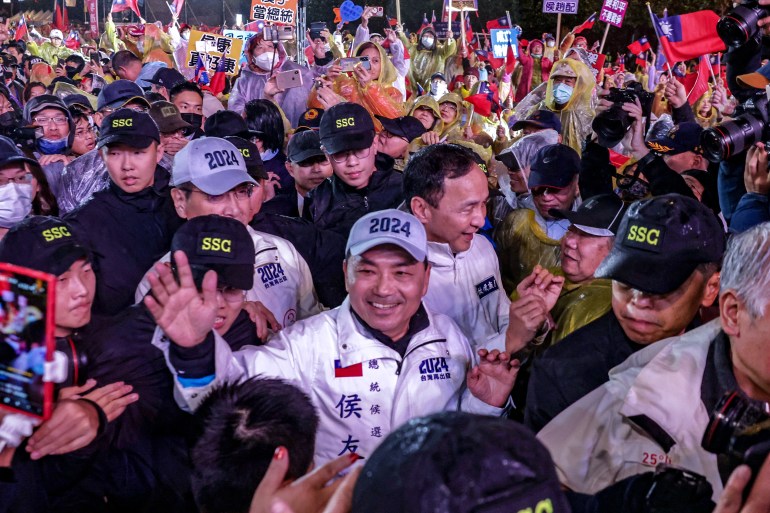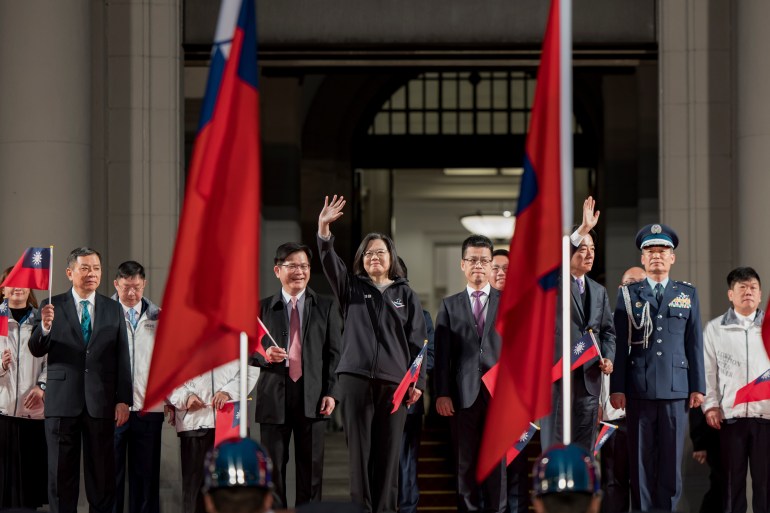It was their first face-to-face summit in a year and the Chinese president was blunt – Taiwan, Xi told his US counterpart, was the most important and dangerous issue in the two countries’ fractious relationship.
Beijing’s policy towards the self-ruled island it claims as its own will again be under the spotlight when voters in Taiwan go to the polls on January 13 to choose a new president and parliament, and the United States will be watching closely.
At the moment, William Lai Ching-te, the incumbent vice president and the candidate of the ruling Democratic Progressive Party (DPP), is expected to emerge the winner.
That result would likely rankle Beijing, which portrays Lai as a “separatist” bent on independence and ensure continued tension across the narrow strait that separates the island from China.
“Washington is well prepared to deal with any choice that the Taiwan electorate makes, but there’s certainly going to be different opportunities and challenges depending on what the results of the election are,” Rorry Daniels, the managing director of the Asia Society Policy Institute, told Al Jazeera, adding that the US would be considering strategies for the “appropriate political signals” to deter any Chinese military responses.

Beijing has stepped up pressure on Taiwan since voters first elected the DPP’s Tsai Ing-wen as president in 2016, cutting off all official dialogue, conducting military activities around the island and encouraging Taipei’s few remaining formal diplomatic allies to switch recognition to Beijing.
The US, which maintains official ties with China, is, however, Taiwan’s most significant international supporter and is bound by law to provide Taipei with the means to defend itself. In August, it approved the sale of millions of dollars of military equipment and weapons to the island.
Potential outcomes
Opinion polls put Lai just ahead of Hou Yu-ih from the opposition Kuomintang (KMT).
While the KMT is seen as friendlier towards Beijing, none of the candidates supports the unification which is a cornerstone of Beijing’s policy towards the island. All the candidates, to varying degrees, want to continue cooperation with the US and keep China’s influence at bay.
Since taking office, Tsai, who argues that the people of Taiwan should choose their future, has bolstered cooperation with Washington, welcoming dozens of US politicians, including former House of Representatives Speaker Nancy Pelosi and meeting key representatives on stopovers in the US, despite fury in China.
“She is now, I would argue, the best Taiwan president the US will ever get,” said Kharis Templeman, the programme manager of the Project on Taiwan in the Indo-Pacific at Stanford University’s Hoover Institution.
A victory for the DPP’s Lai, who has also visited the US, could further distance Taiwan from Beijing, which has accused Lai of calling for independence and risking war.
When Pelosi visited Taipei in August 2022, Beijing launched unprecedented war games over and around the island and cut military communication channels with Washington.
“Lai will be very focused in the absence of open channels for dialogue with Beijing, making sure his US relationships are really strong,” said Daniels.

If the KMT’s Hou were to win, Daniels says the US would need to figure out how to counter the probable increased influence of Beijing, but analysts say a Hou victory could also be potentially beneficial to US-China ties by lowering the temperature in cross-strait relations.
“That would allow the US and China to move Taiwan from the centre of the relationship off to the side,” Stanford’s Templeman noted.
One caveat is that parliamentary elections will also take place on January 13 and while Lai is leading the surveys for president, experts say the DPP could lose its majority in the legislature.
In that kind of scenario, the US government will be watching the candidates to see how they cope with inter and intra-party negotiations.
Questions have already been raised over the ability of the opposition parties to work together after the KMT and Taiwan People’s Party’s attempt to submit a unity ticket and mount a concerted challenge to the DPP collapsed in disarray. Hou and the TPP’s Ko Wen-je ended up in an embarrassing public debacle, unable to agree on which candidate would run as the president.
Policy and principle
Whatever the outcome, the US will continue to stress the need for dialogue and avoiding military confrontation, especially since the military dialogue that was a casualty of Pelosi’s visit was revived last month.
In recent years, the US has stepped up transits through the Taiwan Strait and Daniels says that carries a risk of being misconstrued.
“We’re going to see these minor flare-ups that each side thinks is for defensive purposes that are perceived as so aggressive by the other side, that it starts an escalatory cycle,” Daniels told Al Jazeera.
Instead of high-profile diplomatic visits that have raised the political and military temperature, Daniels suggests the US could push forward with more substantive commitments.
“A US-Taiwan free-trade agreement would be a really strong signal of support in the relationship. And the US can deliver on its foreign military sales to Taiwan,” Daniels said. “Taiwan’s bought a lot of equipment and from my understanding, that has not been delivered yet.”

While Washington supports deterrence for Taiwan, for years it has maintained a purposefully vague policy of “strategic ambiguity” on Taiwan’s status that is typified by its approach to “One China”.
For the US, One China is a policy that officially recognises Beijing as the sole legitimate government of China and acknowledges, but does not accept, Beijing’s position that Taiwan is part of China.
For Beijing, in contrast, One China is a principle, one that provides the basis of its claim to sovereignty over Taiwan.
Since Biden came to power in 2021, however, there have been questions over whether the US might have changed its approach.
On several occasions, the president has said the US would defend Taiwan in the instance of a military conflict with Beijing, prompting the White House to qualify his comments and reiterate that the status quo has remained.
“There’s a kind of contradiction at the heart of US policy towards Taiwan – it does lead to some scepticism overall of the United States,” said Templeman.
‘Beyond our control’
Among those casting doubt on the US commitment to Taiwan is documentary filmmaker S Leo Chiang, who follows US politicians’ statements on Taiwan closely.
“Biden says one thing but the administration says another. It’s just endless uncertainties,” Chiang told Al Jazeera.
Chiang is not the only person who is asking questions about US commitment.
A survey conducted in September by the Institute of European and American Studies at Academia Sinica, Taiwan’s top research institution, showed that trust in the US among people in Taiwan had declined from 45.3 percent in 2021 to 34 percent this year.
Nearly a third said they did not think the US would use force to help Taiwan in the event that Beijing resorted to force to achieve its goal of taking control of the island.
Both a US and Taiwanese passport holder, Chiang has spent time living in both countries. As a Taiwanese resident who plans on voting, he says watching Congress split and Republicans block sending additional aid to Ukraine last month was a worrying sign.
“My biggest fear is the politicisation of Ukraine, like that’s going to happen in Taiwan,” Chiang said. “They’re out there telling the world we’re defenders of democracy but when it’s all said and done, that’s actually not always the case.”
But experts warn against making direct comparisons between Taiwan and Ukraine. Taiwan is the US’s 10th largest trading partner and a critical source of advanced semiconductor chips, notes Templeman underlining the close economic relationship.

Caught in the crosshairs of two superpowers are the more than 23 million Taiwanese citizens.
Chiang grew up in the 1970s when Taiwan was under martial law and his grandmother’s basement was designated as the bomb shelter for the neighbourhood’s block during military drills.
Today, Taiwan is one of the region’s most robust democracies and the underground rooms are living and storage spaces.
“We lived with this for so long, and there’s this feeling it’s beyond our control,” Chiang said. “I want to see Taiwan have the rights of self-determination. And that’s unfortunately not going to happen anytime soon – it’s a major source of frustration.”
